10 Best Herbal Baths For Hair Fall

Herbal baths can be an effective natural remedy for reducing hair fall by nourishing the scalp and promoting healthy hair growth.
Ingredients like neem, amla, and fenugreek are commonly used in herbal baths due to their antimicrobial, antioxidant, and strengthening properties. These herbs help to detoxify the scalp, improve blood circulation, and strengthen hair roots, which can minimize breakage and shedding. To use an herbal bath, simply steep the chosen herbs in hot water and let the steam open the pores before rinsing the scalp and hair.
Regular use of such baths can lead to noticeable improvements in hair thickness and overall scalp health.
Table of Contents
- 1. Field horsetail (Equisetum arvense)
- 2. Rosemary (Rosmarinus officinalis)
- 3. Stinging nettle (Urtica dioica)
- 4. St. john's wort (Hypericum perforatum)
- 5. Turmeric (Curcuma longa)
- 6. Aloe vera (Aloe barbadensis)
- 7. English lavender (Lavandula angustifolia)
- 8. Blessed thistle (Cnicus benedictus)
- 9. Chaste tree (Vitex agnus-castus)
- 10. Fennel (Foeniculum vulgare)
1. Field horsetail (Equisetum arvense)

Equisetum arvense, commonly known as horsetail, is a traditional herb renowned for its high concentration of silica, which is essential for strengthening hair and promoting healthy growth.
Herbal baths infused with horsetail can help reduce hair fall by improving scalp health and enhancing the overall strength of hair strands. The silica content in horsetail supports the production of keratin, a key protein in hair, leading to reduced breakage and increased thickness. To prepare the bath, steep dried horsetail in hot water for several hours and then use the infused water to rinse the hair after shampooing.
Regular use of horsetail herbal baths can be a natural and effective way to combat hair loss and improve the appearance of hair over time.
2. Rosemary (Rosmarinus officinalis)

Rosmarinus officinalis, commonly known as rosemary, is a popular herb used in herbal baths to promote hair health and reduce hair fall.
The essential oils in rosemary are believed to stimulate blood circulation in the scalp, which can enhance nutrient delivery to hair follicles and strengthen hair roots. When used in a bath, rosemary can help soothe the scalp and reduce dandruff, which are common contributors to hair loss. To prepare a rosemary bath, one can add a few drops of rosemary essential oil to warm water or use a rosemary-infused herbal tea as the bathwater.
Regular use of rosemary baths may contribute to healthier hair growth and minimize the risk of excessive hair fall over time.
3. Stinging nettle (Urtica dioica)

Urtica dioica, commonly known as stinging nettle, has been traditionally used in herbal baths to promote hair health and reduce hair fall.
The plant contains essential nutrients like iron, silica, and antioxidants that strengthen hair follicles and improve scalp circulation. When used in a bath, the leaves release beneficial compounds that can soothe the scalp and reduce inflammation, which is often a contributing factor to hair loss. To prepare the bath, fresh or dried nettle leaves can be steeped in hot water and then used as a rinse or added directly to the bathwater.
Regular use of urtica dioica herbal baths may help nourish the hair, enhance growth, and minimize breakage, making it a natural remedy for those experiencing excessive hair fall.
4. St. john's wort (Hypericum perforatum)

Hypericum perforatum, commonly known as St. John's Wort, has been traditionally used in herbal baths to promote hair health and potentially reduce hair fall.
When infused into bath water, the oil from the dried plant may help nourish the scalp and strengthen hair follicles. The anti-inflammatory and antioxidant properties of hypericum perforatum may support a healthy scalp environment, which is essential for preventing excessive hair loss. Some studies suggest that the compounds in St. John's Wort may stimulate blood circulation in the scalp, enhancing nutrient delivery to hair roots.
While more research is needed, many people use hypericum perforatum baths as a natural remedy to improve hair density and reduce breakage.
5. Turmeric (Curcuma longa)
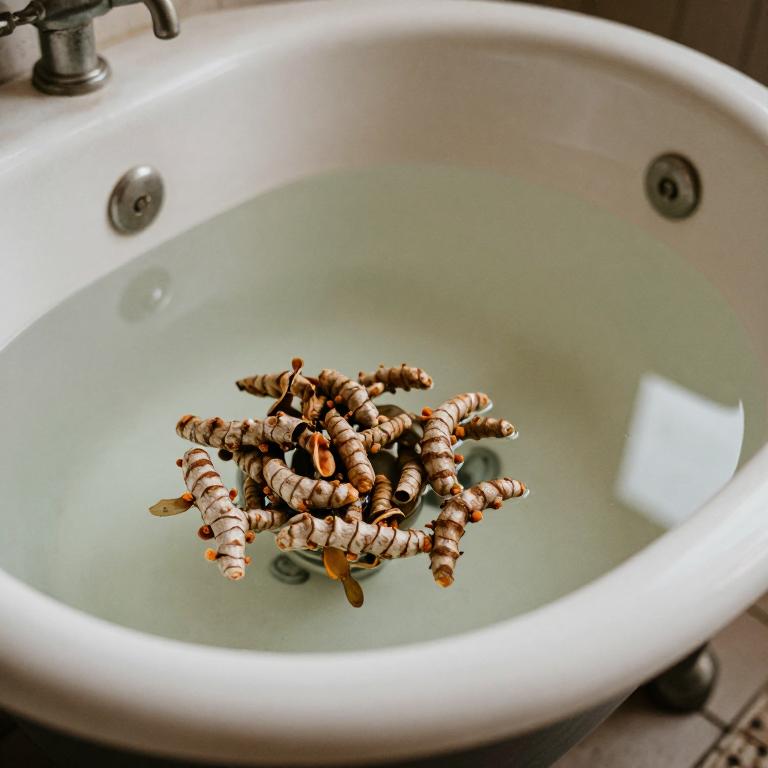
Curcuma longa, commonly known as turmeric, has been traditionally used in herbal baths to promote healthy hair growth and reduce hair fall.
The active compound in turmeric, curcumin, possesses strong anti-inflammatory and antioxidant properties that can help strengthen hair follicles and improve scalp health. When incorporated into a warm herbal bath, turmeric can enhance blood circulation to the scalp, which may stimulate hair growth and prevent premature shedding. Regular use of turmeric baths can also help reduce dandruff and other scalp conditions that contribute to hair loss.
However, it is important to use turmeric in moderation and ensure it is properly diluted to avoid skin irritation.
6. Aloe vera (Aloe barbadensis)
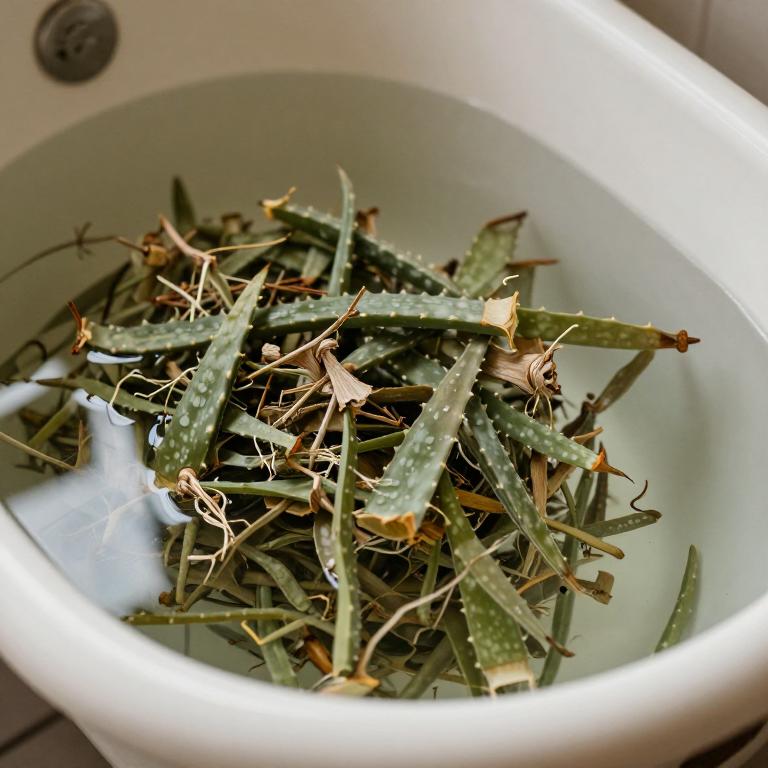
Aloe barbadensis, commonly known as aloe vera, is often used in herbal baths to promote healthy hair and reduce hair fall.
The gel extracted from the aloe plant contains essential nutrients such as vitamins, minerals, and amino acids that nourish the scalp and strengthen hair follicles. When used in a bath, aloe vera helps moisturize the scalp, reduce dandruff, and improve blood circulation, which can stimulate hair growth. Regular use of aloe-based herbal baths may help minimize breakage and shedding, leading to thicker and healthier hair over time.
However, it is important to ensure the aloe is pure and free from additives to avoid skin irritation.
7. English lavender (Lavandula angustifolia)

Lavandula angustifolia, commonly known as English lavender, is widely used in herbal baths to promote scalp health and reduce hair fall.
The essential oils from this plant contain compounds like linalool and lavandulyl acetate, which have soothing and anti-inflammatory properties that can help calm an irritated scalp. When added to a warm bath, lavender oil can improve blood circulation to the scalp, encouraging healthier hair growth. Regular use of lavender-infused baths may help strengthen hair follicles and reduce the risk of breakage.
This natural remedy is a gentle and effective option for those seeking to address hair fall without harsh chemicals.
8. Blessed thistle (Cnicus benedictus)
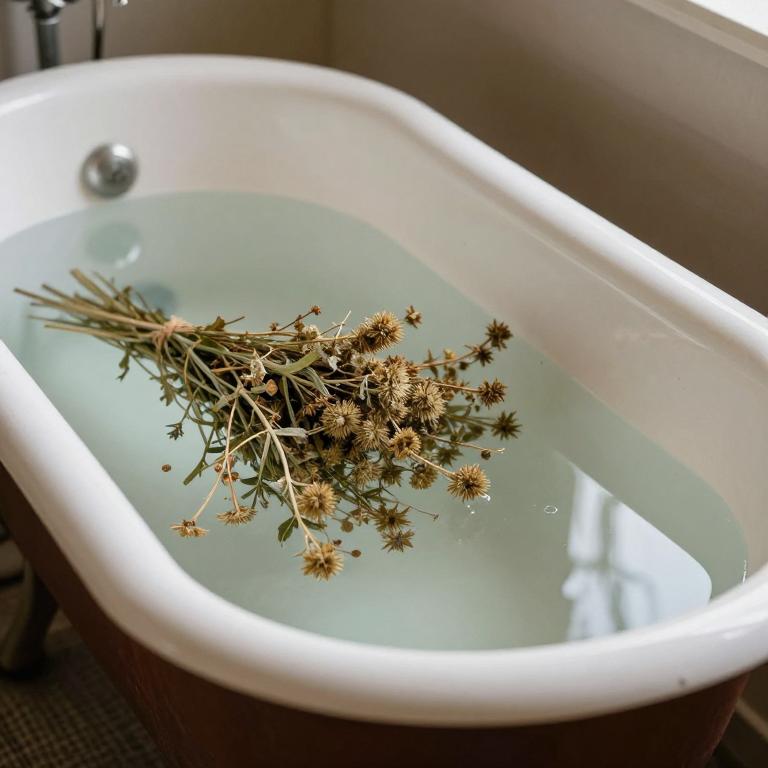
Cnicus benedictus, commonly known as St. John's Wort, has been traditionally used in herbal baths to promote healthy hair and reduce hair fall.
The plant contains bioactive compounds such as hypericin and flavonoids, which are believed to have antimicrobial and anti-inflammatory properties that can benefit scalp health. When infused into bath water, these compounds may help soothe the scalp, improve circulation, and strengthen hair follicles. Regular use of St. John's Wort herbal baths is thought to nourish the hair roots and reduce excessive shedding.
However, it is important to consult a healthcare professional before using it, especially if you are on medications, due to its potential interactions.
9. Chaste tree (Vitex agnus-castus)
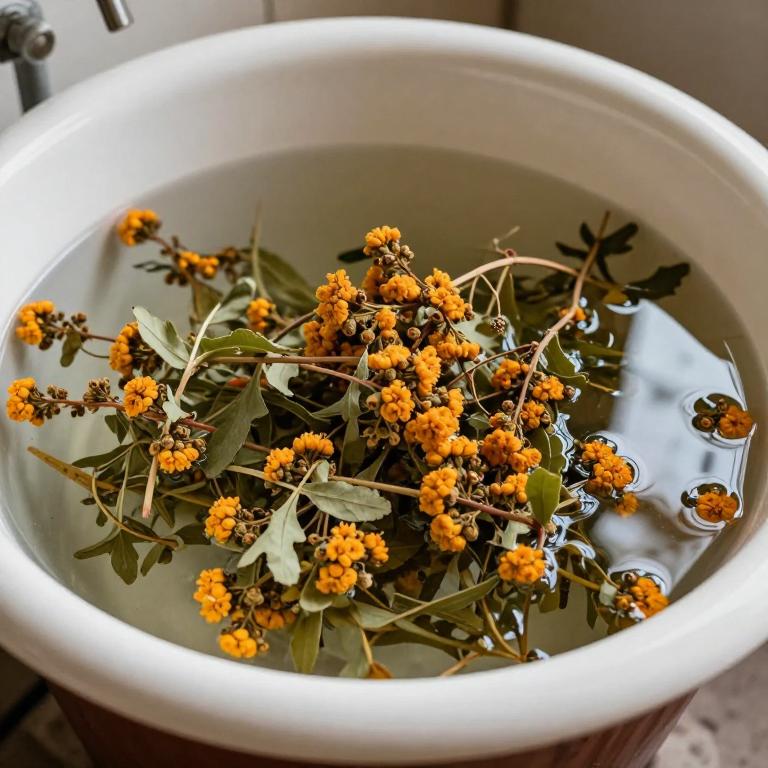
Vitex agnus-castus, commonly known as chaste tree, has been traditionally used in herbal baths to support hair health and reduce hair fall.
The herb is believed to balance hormonal fluctuations, which can contribute to hair thinning and loss, making it particularly beneficial for women experiencing hormonal imbalances. When used in a bath, the essential oils and compounds from vitex can be absorbed through the skin, promoting scalp health and improving circulation to the hair follicles. Regular use of vitex-infused baths may help strengthen hair roots and encourage thicker, healthier hair growth.
However, it is advisable to consult with a healthcare provider before incorporating this herb into a hair care routine, especially for those with existing medical conditions or on medication.
10. Fennel (Foeniculum vulgare)
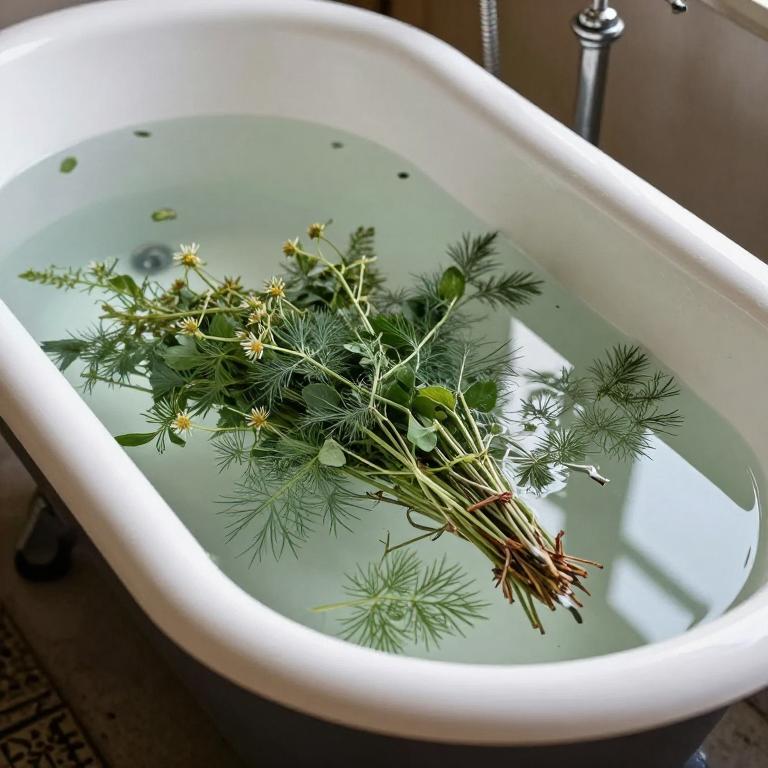
Foeniculum vulgare, commonly known as fennel, is a herbal remedy that has been traditionally used to promote healthy hair growth and reduce hair fall.
When incorporated into herbal baths, fennel's essential oils and nutrients can nourish the scalp, improve blood circulation, and strengthen hair follicles. To prepare a fennel herbal bath, one can steep fresh or dried fennel seeds in hot water for several hours, then use the infused water to rinse the hair after shampooing. Regular use of fennel baths may help alleviate dandruff and scalp infections, which are often contributing factors to hair loss.
Overall, fennel herbal baths offer a natural and soothing approach to supporting hair health and minimizing hair fall.